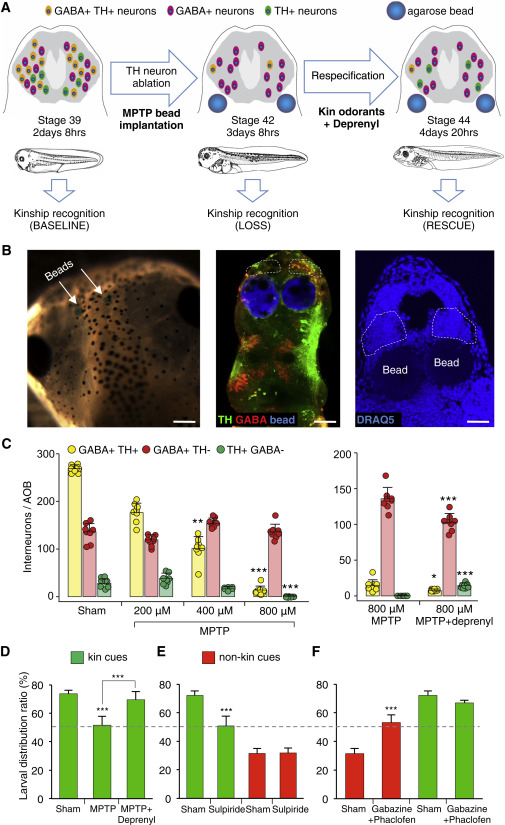Our official English website, www.x-mol.net, welcomes your
feedback! (Note: you will need to create a separate account there.)
Neurotransmitter Switching Regulated by miRNAs Controls Changes in Social Preference.
Neuron ( IF 14.7 ) Pub Date : 2017-Sep-13 , DOI: 10.1016/j.neuron.2017.08.023 Davide Dulcis 1 , Giordano Lippi 2 , Christiana J Stark 1 , Long H Do 3 , Darwin K Berg 2 , Nicholas C Spitzer 2
Neuron ( IF 14.7 ) Pub Date : 2017-Sep-13 , DOI: 10.1016/j.neuron.2017.08.023 Davide Dulcis 1 , Giordano Lippi 2 , Christiana J Stark 1 , Long H Do 3 , Darwin K Berg 2 , Nicholas C Spitzer 2
Affiliation

|
Changes in social preference of amphibian larvae result from sustained exposure to kinship odorants. To understand the molecular and cellular mechanisms of this neuroplasticity, we investigated the effects of olfactory system activation on neurotransmitter (NT) expression in accessory olfactory bulb (AOB) interneurons during development. We show that protracted exposure to kin or non-kin odorants changes the number of dopamine (DA)- or gamma aminobutyric acid (GABA)-expressing neurons, with corresponding changes in attraction/aversion behavior. Changing the relative number of dopaminergic and GABAergic AOB interneurons or locally introducing DA or GABA receptor antagonists alters kinship preference. We then isolate AOB microRNAs (miRs) differentially regulated across these conditions. Inhibition of miR-375 and miR-200b reveals that they target Pax6 and Bcl11b to regulate the dopaminergic and GABAergic phenotypes. The results illuminate the role of NT switching governing experience-dependent social preference. VIDEO ABSTRACT.
中文翻译:

miRNA 调节的神经递质转换控制着社会偏好的变化。
两栖动物幼虫的社会偏好的变化是由于持续接触亲缘气味剂造成的。为了了解这种神经可塑性的分子和细胞机制,我们研究了发育过程中嗅觉系统激活对辅助嗅球(AOB)中间神经元神经递质(NT)表达的影响。我们发现,长期接触亲属或非亲属气味会改变表达多巴胺(DA)或γ氨基丁酸(GABA)的神经元的数量,从而导致吸引/厌恶行为发生相应的变化。改变多巴胺能和 GABA 能 AOB 中间神经元的相对数量或局部引入 DA 或 GABA 受体拮抗剂会改变亲缘偏好。然后,我们分离出在这些条件下差异调节的 AOB microRNA (miR)。miR-375 和 miR-200b 的抑制表明它们靶向 Pax6 和 Bcl11b 来调节多巴胺能和 GABA 能表型。结果阐明了 NT 转换在控制经验依赖的社会偏好中的作用。视频摘要。
更新日期:2017-08-31
中文翻译:

miRNA 调节的神经递质转换控制着社会偏好的变化。
两栖动物幼虫的社会偏好的变化是由于持续接触亲缘气味剂造成的。为了了解这种神经可塑性的分子和细胞机制,我们研究了发育过程中嗅觉系统激活对辅助嗅球(AOB)中间神经元神经递质(NT)表达的影响。我们发现,长期接触亲属或非亲属气味会改变表达多巴胺(DA)或γ氨基丁酸(GABA)的神经元的数量,从而导致吸引/厌恶行为发生相应的变化。改变多巴胺能和 GABA 能 AOB 中间神经元的相对数量或局部引入 DA 或 GABA 受体拮抗剂会改变亲缘偏好。然后,我们分离出在这些条件下差异调节的 AOB microRNA (miR)。miR-375 和 miR-200b 的抑制表明它们靶向 Pax6 和 Bcl11b 来调节多巴胺能和 GABA 能表型。结果阐明了 NT 转换在控制经验依赖的社会偏好中的作用。视频摘要。











































 京公网安备 11010802027423号
京公网安备 11010802027423号